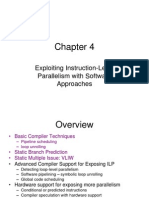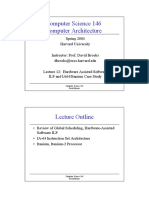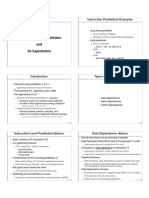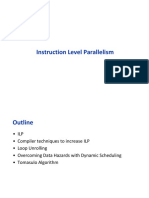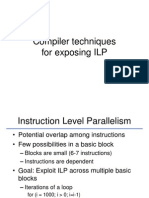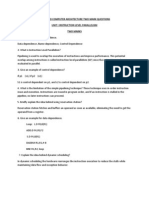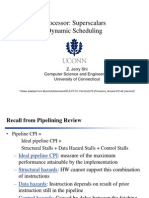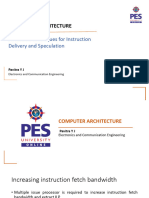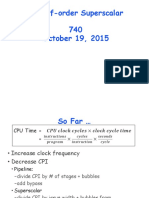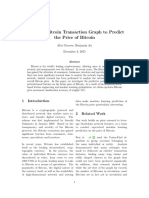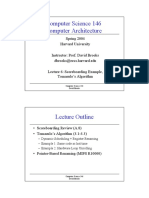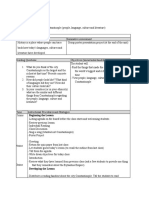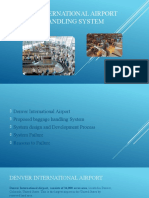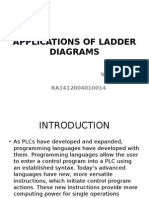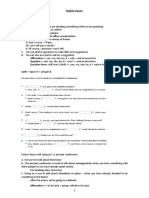Computer Science 146
Computer Architecture
Spring 2004
Harvard University
Instructor: Prof. David Brooks
dbrooks@eecs.harvard.edu
Lecture 11: Software Pipelining and
Global Scheduling
Computer Science 146
David Brooks
Lecture Outline
Review of Loop Unrolling
Software Pipelining
Global Scheduling
Trace Scheduling, Superblocks
Next Time
Hardware-Assisted, Software ILP
Conditional, Predicated Instructions
Compiler Speculation with Hardware Support
Hardware vs. Software comparison
Itanium Implementation
Computer Science 146
David Brooks
�Compiler Loop Unrolling
1.
2.
3.
4.
5.
Check OK to move the S.D after DSUBUI and BNEZ, and find amount to
adjust S.D offset
Determine unrolling the loop would be useful by finding that the loop
iterations were independent
Rename registers to avoid name dependencies
Eliminate extra test and branch instructions and adjust the loop
termination and iteration code
Determine loads and stores in unrolled loop can be interchanged by
observing that the loads and stores from different iterations are
independent
6.
requires analyzing memory addresses and finding that they do not refer to the
same address.
Schedule the code, preserving any dependences needed to yield same
result as the original code
Computer Science 146
David Brooks
Loop Unrolling Limitations
Decrease in amount of overhead amortized per
unroll
Diminishing returns in reducing loop overheads
Growth in code size
Can hurt instruction-fetch performance
Register Pressure
Aggressive unrolling/scheduling can exhaust 32 register
machines
Computer Science 146
David Brooks
�Loop Unrolling Problem
overlapped ops
Every loop unrolling iteration requires pipeline to fill and
drain
Occurs every m/n times if loop has m iterations and is
unrolled n times
Proportional to
Number of Unrolls
Overlap between
Unrolled iterations
Time
Computer Science 146
David Brooks
More advanced Technique:
Software Pipelining
Observation: if iterations from loops are independent, then can get
more ILP by taking instructions from different iterations
Software pipelining: reorganizes loops so that each iteration is
made from instructions chosen from different iterations of the
original loop (~ Tomasulo in SW)
Iteration
0
Iteration
Iteration
1
Iteration
2
3
Iteration
4
Softwarepipelined
iteration
Computer Science 146
David Brooks
�Software Pipelining
Now must optimize
inner loop
Want to do as much
work as possible in
each iteration
Keep all of the
functional units busy in
the processor
for(j = 0; j < MAX; j++)
C[j] += A * B[j];
Dataflow graph:
load B[j]
load C[j]
+
store C[j]
Computer Science 146
David Brooks
Software Pipelining Example
for(j = 0; j < MAX; j++)
Pipelined:
Not pipelined:
load B[j]
load C[j]
load B[j]
load C[j]
load B[j]
load C[j]
load B[j]
store C[j]
load C[j]
load B[j]
store C[j]
load C[j]
load B[j]
store C[j]
load C[j]
load B[j]
store C[j]
load C[j]
load B[j]
store C[j]
load C[j]
store C[j]
Fill
C[j] += A * B[j];
*
+
load C[j]
A
*
+
store C[j]
load B[j]
A
*
+
store C[j]
Drain
load C[j]
Steady State
store C[j]
load B[j]
store C[j]
�Software Pipelining Example
Symbolic Loop Unrolling
overlapped ops
After: Software Pipelined
Before: Unrolled 3 times
1 S.D
0(R1),F4 ; Stores M[i]
1 L.D
F0,0(R1)
2 ADD.D F4,F0,F2 ; Adds to M[i-1]
2 ADD.D
F4,F0,F2
3 L.D
F0,-16(R1); Loads M[i-2]
3 S.D
0(R1),F4
4
DSUBUI
R1,R1,#8
4 L.D
F6,-8(R1)
5 BNEZ
R1,LOOP
5 ADD.D
F8,F6,F2
6 S.D
-8(R1),F8
7 L.D
F10,-16(R1)
SW Pipeline
8 ADD.D
F12,F10,F2
9 S.D
-16(R1),F12
10 DSUBUI
R1,R1,#24
Time
11 BNEZ
R1,LOOP
Loop Unrolled
Maximize result-use distance
Less code space than unrolling
Fill & drain pipe only once per loop
vs. once per each unrolled iteration in loop unrolling
Time
5 cycles per iteration
Software Pipelining vs. Loop
Unrolling
Software pipelining is symbolic loop unrolling
Consumes less code space
Actually they are targeting different things
Both provide a better scheduled inner loop
Loop Unrolling
Targets loop overhead code (branch/counter update code)
Software Pipelining
Targets time when pipelining is filling and draining
Best performance can come from doing both
Computer Science 146
David Brooks
�When Safe to Unroll Loop?
Example: Where are data dependencies?
(A,B,C distinct & nonoverlapping)
for (i=0; i<100; i=i+1) {
A[i+1] = A[i] + C[i];
/* S1 */
B[i+1] = B[i] + A[i+1]; /* S2 */
}
1. S2 uses the value, A[i+1], computed by S1 in the same iteration.
2. S1 uses a value computed by S1 in an earlier iteration, since iteration i
computes A[i+1] which is read in iteration i+1. The same is true of S2 for B[i]
and B[i+1].
This is a loop-carried dependence: between iterations
For our prior example, each iteration was distinct
Implies that iterations cant be executed in parallel?
Computer Science 146
David Brooks
VLIW vs. SuperScalar
Superscalar processors decide on the fly how
many instructions to issue
HW complexity of Number of instructions to issue
O(n2)
Proposal: Allow compiler to schedule instruction
level parallelism explicitly
Format the instructions in a potential issue packet
so that HW need not check explicitly for
dependences
Computer Science 146
David Brooks
�VLIW: Very Large Instruction
Word
Each instruction has explicit coding for multiple
operations
In IA-64, grouping called a packet
Tradeoff instruction space for simple decoding
Slots are available for many ops in the instruction word
By definition, all the operations the compiler puts in the long
instruction word are independent => execute in parallel
E.g., 2 integer operations, 2 FP ops, 2 Memory refs, 1 branch
16 to 24 bits per field => 7*16 or 112 bits to 7*24 or 168 bits wide
Need compiling technique that schedules across several
branches (Discussed next time)
Computer Science 146
David Brooks
Recall: Unrolled Loop that
Minimizes Stalls for Scalar
1 Loop:
2
3
4
5
6
7
8
9
10
11
12
13
14
L.D
L.D
L.D
L.D
ADD.D
ADD.D
ADD.D
ADD.D
S.D
S.D
S.D
DSUBUI
BNEZ
S.D
F0,0(R1)
F6,-8(R1)
F10,-16(R1)
F14,-24(R1)
F4,F0,F2
F8,F6,F2
F12,F10,F2
F16,F14,F2
0(R1),F4
-8(R1),F8
-16(R1),F12
R1,R1,#32
R1,LOOP
8(R1),F16
L.D to ADD.D: 1 Cycle
ADD.D to S.D: 2 Cycles
; 8-32 = -24
14 clock cycles, or 3.5 per iteration
Computer Science 146
David Brooks
�Loop Unrolling in VLIW
Memory
reference 1
Memory
reference 2
L.D F0,0(R1)
L.D F10,-16(R1)
L.D F18,-32(R1)
L.D F26,-48(R1)
L.D F6,-8(R1)
L.D F14,-24(R1)
L.D F22,-40(R1)
S.D 0(R1),F4
S.D -16(R1),F12
S.D -32(R1),F20
S.D -0(R1),F28
S.D -8(R1),F8
S.D -24(R1),F16
S.D -40(R1),F24
FP
operation 1
ADD.D F4,F0,F2
ADD.D F12,F10,F2
ADD.D F20,F18,F2
ADD.D F28,F26,F2
FP
op. 2
Int. op/
branch
Clock
1
2
3
4
5
6
7
8
9
ADD.D F8,F6,F2
ADD.D F16,F14,F2
ADD.D F24,F22,F2
DSUBUI R1,R1,#48
BNEZ R1,LOOP
Unrolled 7 times to avoid delays
7 results in 9 clocks, or 1.3 clocks per iteration (1.8X)
Average: 2.5 ops per clock, 50% efficiency
Note: Need more registers in VLIW (15 vs. 6 in SS)
Software Pipelining with
Loop Unrolling in VLIW
Memory
reference 1
Memory
reference 2
FP
operation 1
L.D F0,-48(R1)
L.D F6,-56(R1)
L.D F10,-40(R1)
ST 0(R1),F4
ST -8(R1),F8
ST 8(R1),F12
ADD.D F4,F0,F2
ADD.D F8,F6,F2
ADD.D F12,F10,F2
FP
op. 2
Int. op/
branch
DSUBUI R1,R1,#24
BNEZ R1,LOOP
Clock
1
2
3
Software pipelined across 9 iterations of original loop
In each iteration of above loop, we:
Store to m,m-8,m-16
Compute for m-24,m-32,m-40
Load from m-48,m-56,m-64
(iterations I-3,I-2,I-1)
(iterations I,I+1,I+2)
(iterations I+3,I+4,I+5)
9 results in 9 cycles, or 1 clock per iteration
Average: 3.3 ops per clock, 66% efficiency
Note: Need fewer registers for software pipelining
(only using 7 registers here, was using 15)
�Global Scheduling
Previously we focused on loop-level parallelism
Unrolling, Software Pipelining + scheduling work well
These work best on single basic blocks (repeatable
schedules)
Basic Block Single Entry/Single Exit Instruction Sequence
What about internal control flow?
What about if-branches instead of loop-branches?
Computer Science 146
David Brooks
Global Scheduling
How to move computation and
assignment of B[i]?
Relative execution frequency?
How cheap to execute B[i] above
the branch?
How much benefit to executing B[i]
early? (critical path?)
What is the cost of compensation
code for the else case?
What about moving C[i]?
Computer Science 146
David Brooks
�Static Branch Prediction
Simplest: Predict taken
Misprediction rate = untaken branch frequency => for SPEC
programs is 34%.
Range is quite large though (from not very accurate (59%) to highly
accurate (9%))
Predict on the basis of branch direction? (P6 on BTB miss)
choosing backward-going branches to be taken (loop)
forward-going branches to be not taken (if)
SPEC programs, however, most forward-going branches are taken
=> predict taken is better
Predict branches on the basis of profile information
collected from earlier runs
Misprediction varies from 5% to 22%
Computer Science 146
David Brooks
Trace Scheduling
Parallelism across IF branches vs. LOOP branches?
Two steps:
Trace Selection
Find likely sequence of basic blocks (trace)
of (statically predicted or profile predicted)
long sequence of straight-line code
Trace Compaction
Squeeze trace into few VLIW instructions
Need bookkeeping code in case prediction is wrong
This is a form of compiler-generated speculation
Compiler must generate fixup code to handle cases in which trace is
not the taken branch
Needs extra registers: undoes bad guess by discarding
Computer Science 146
David Brooks
10
�Trace Scheduling
Use loop unrolling, static
branch prediction to
generate long traces
Trace scheduling:
Bookkeeping code is
needed when code is
moved across trace entry
and exit points
Computer Science 146
David Brooks
Superblocks
Fixes a major drawback of trace scheduling
Entries and exits in the middle of the trace are complicated
Superblocks
Use a similar process as trace generation, but superblocks
are restriced to a single entry point with multiple exit points
Scheduling (compaction) is simpler
Only code motion across exits must be considered
Only one entrance?
Tail duplication is used to create a separate block that
corresponds to the portion of the trace after entry
Computer Science 146
David Brooks
11
�Superblocks
What if branches are not
statically predictable?
Loop Unrolling, Trace scheduling work great
when branches are fairly predictable statically
Same thing with memory reference dependencies
Compiler Speculation is needed to solve this
Conditional/Predicated instructions if-conversion
Hardware support for exception/memory-dependence
checks
Computer Science 146
David Brooks
12
�Hardware Support for Exposing
More Parallelism at Compile-Time
Conditional or Predicated Instructions
Conditional instruction execution
Full predication every instruction has predicate tag
(IA64)
Conditional Moves (Alpha, IA32, etc)
if(r3==0)r1=r2
BNEZ R3, L
ADDU R1, R2, R0
cmoveqz r1, r2, r3
L:
Computer Science 146
David Brooks
Schedule for next few lectures
Next Time (Mar. 17th) HW#3 Due Friday
Hardware support for software-ILP
Itanium (IA64) case study
Review for midterm (Mar 22nd)
Midterm March 24th
Computer Science 146
David Brooks
13


